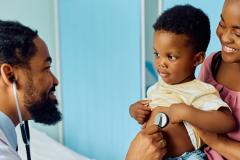- Overview
-
Preeclampsia and high blood pressure (BP) in pregnancy affects 1 in 10 pregnancies. Currently, experts recommend that BPs are measured and medications are given based on BP readings in the maternity care-providers' offices. This may be inaccurate because pregnant women often have a "white–coat effect," experiencing a higher BP reading in the office. Many physicians already use home BP monitoring in pregnant women to get a more "accurate" BP reading. The problem with this approach is no guidelines for properly measuring BP at home exist in pregnancy. The goal of our research is to understand how physicians use HBPM and the experiences of home monitoring in pregnant women.
- Research
-
Systematic review and meta-analysis of home blood pressure monitoring in pregnancy
Systematic review and meta-analysis of home blood pressure monitoring in pregnancy
We completed a systematic review and meta-analysis to understand how home blood pressure monitoring was used in pregnant women. We noted that wide variation in patterns of practice exist on how physicians prescribe home BP monitoring in pregnancy.Validation of BpTRU, an automated blood pressure monitor, in pregnancy
BpTRU is a common automated BP monitor used in non-pregnant adults, however, little information exists on whether this is an accurate BP device in pregnancy. We conducted a validation study and found that BpTRU is not validated to be used in pregnancy or in women with preeclampsia.GrantsUBC GIM CALI Physicians Coordinating Liaison Committee
Honours & AwardsHonour Roll for Clinical Teaching Excellence Award, University of British Columbia Department of Medicine. (June 2018, 2019)
Top Poster at North America Society of Obstetrical Medicine Conference (October 30, 2016)
Top Poster at Canadian Hypertension Congress (October 21, 2016)
Canadian Society of Internal Medicine Research and Education Fund (October 2015)
Research Group MembersAlia Izquierdo, Research Coordinator
Congratulations CIHR Spring 2023 Project Grant recipients
Congratulations to the BC Children's Hospital Research Institute (BCCHR) and Women’s Health Research Institute (WHRI) investigators and their teams who were awarded funding through the Canadian Institutes of Health Research (CIHR) Spring 2023 Project Grant competition. Our research community received around $8 million in new research grants as principal investigators or co-investigators.






